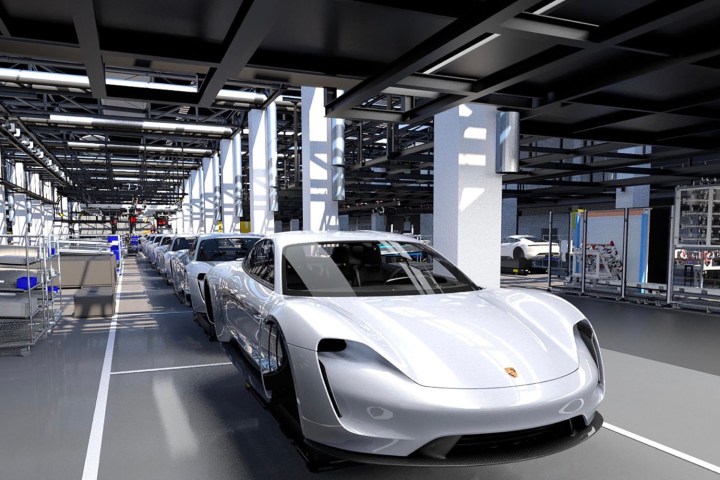
Porsche is preparing to launch its first production electric car, the Taycan. Previewed by a pair of Mission E concepts, the all-electric four-door is expected to launch at the end of 2019. Expected to pack 600 horsepower with a 300-mile range, the Taycan will be Porsche’s rival to the Tesla Model S, and the first of what will likely be many electric cars from the German automaker. But because the Taycan is a different kind of Porsche, it demanded a different kind of factory.
To build the Taycan, Porsche created what it calls a “factory within a factory” at its Zuffenhausen, Germany, plant, which already builds 911, 718 Boxster, and 718 Cayman models. A new body shop and paint shop will accommodate Taycan production, and new Automated Guided Vehicles (AGV) will move bodies around on the factory floor. This eliminates the need for conventional conveyor belts to move bodies and other large assemblies, allowing Porsche to rejigger the setup of its assembly lines on the fly. That’s crucial, as Porsche plans to continue building two-door sports cars alongside the four-door Taycan electric car.
Porsche also promised that the Taycan production process will be carbon neutral, meaning there will be no net carbon emissions associated with building the car. Sibling brand Audi has made a similar claim for its e-tron electric SUV, which will be built in Belgium. A green factory is an important part of minimizing the environmental impact of electric cars. Because electric cars produce no “tailpipe” emissions, the emissions associated with building them make up a larger portion of their overall carbon footprint.
The Taycan assembly line will generate 1,200 new jobs in Zuffenhausen, according to Porsche. Some employees will also transition from other lines to electric-car production. Porsche will use digital training tools to ensure that all employees, new and old, are prepared to work on electric cars.
In addition to upgrading its Zuffenhausen factory, Porsche is preparing for the arrival of the Taycan by making plans for charging stations. Porsche will use the Ionity and Electrify America charging networks for DC fast charging in Europe and the United States, respectively. The automaker also plans to install 2,000 AC charging stations in up to 20 markets. These stations won’t be able to charge as fast as their DC counterparts, but they will be located at hotels and other places where drivers are likely to linger for long periods of time.


